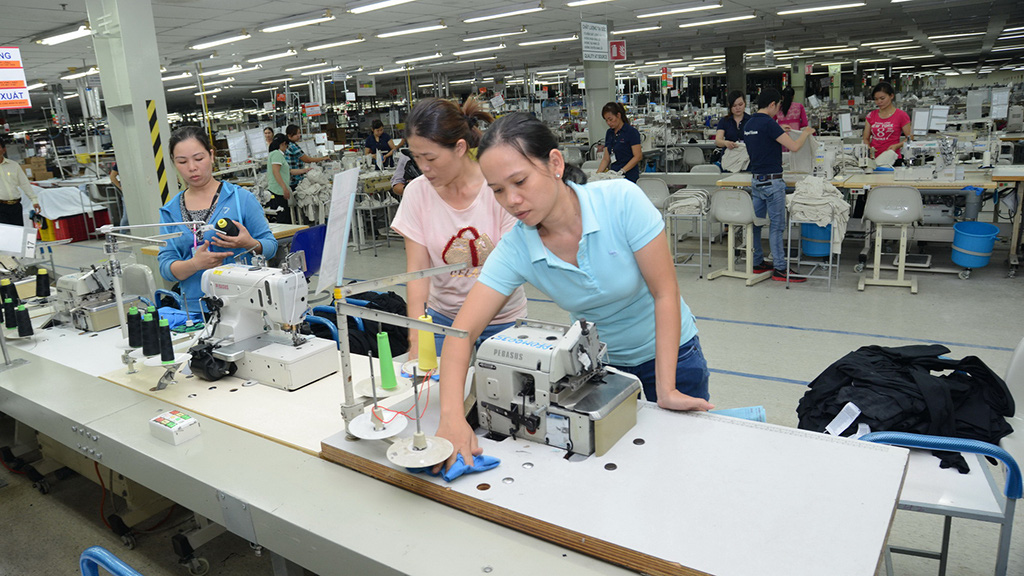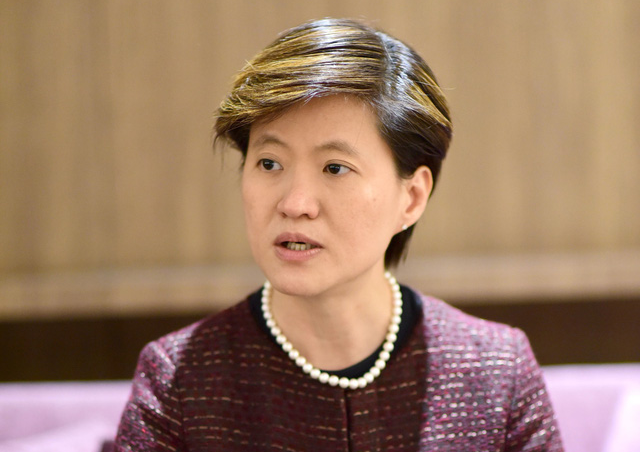Editor's note: During this challenging period, Vietnam has been a valuable partner and friend to Singapore – a testament to the close ties built over the years, Singapore Ambassador to Vietnam Catherine Wong told Tuoi Tre News.
On the occasion of Singapore’s 55th National Day and the 47th anniversary of diplomatic relations between Singapore and Vietnam, Ambassador Wong gave Tuoi Tre News an exclusive interview.
Considering the global health crisis sparked off by the novel coronavirus disease (COVID-19) pandemic, Ambassador Wong shares her thoughts on the future of Singapore, the bilateral relationship between Singapore and Vietnam, as well as her own experience working in Vietnam.
As Vietnam and Singapore celebrate the 47th anniversary of diplomatic relations, what would be the top priority for the relationship this year and beyond? What are Singapore’s policy priorities for Vietnam?
Singapore and Vietnam are long-standing friends that enjoy a close and wide-ranging relationship. Our relations are underpinned by mutual trust, shared interests, and extensive bilateral and multilateral cooperation.
We have strong ties in many areas, including trade, defense, education, investment, finance, tourism and aviation. We want to deepen cooperation in these areas.
Economic cooperation is a key pillar of our bilateral relationship. Notwithstanding the global economic gloom, Vietnam remains an attractive market for Singapore.
We are Vietnam’s third-largest foreign investor, with cumulative investment of more than US$47 billion in more than 2,000 projects. Our bilateral trade has also steadily grown to reach $22.7 billion in 2019.
Moreover, Vietnam’s rapid development has provided new economic opportunities for Singapore companies in sectors such as infrastructure and urban solutions, innovation and startups, and e-commerce.
There is strong interest from the Singapore business community to expand their operations in Vietnam, and we are confident that our economic ties will continue their upward trajectory.
To position Singapore-Vietnam relations for the long term, I believe it is important to strengthen people-to-people ties, especially amongst our youth.
Many Vietnamese study in Singapore, and we continue to warmly welcome them. Student exchanges between our countries are increasing.
With government support, our Institutes of Higher Learning are sending students for internships, immersion and exchange programs, and service learning trips to Vietnam.
Singapore and Vietnamese schools are also organizing more exchange programs and study visits, during which Singaporean students can learn about Vietnam’s society, culture, and business environment. In addition to visiting big cities, they also visit places like Hue and Sa Pa.
Last year, Ngee Ann Polytechnic and Vietnam National University organized the Temasek Foundation Specialists’ Community Action and Leadership Exchange (TF-SCALE) Program, which brought Vietnamese students to Singapore and will bring Singapore students to Vietnam.
While COVID-19 has disrupted these plans, we hope to keep up these exchanges to expose our students to different cultures, broaden their horizons, and ultimately strengthen mutual understanding between our countries over the long term.
You have been an ambassador in Vietnam since 2016. There have been significant developments in the region over these years. Can you share your thoughts on your work in Vietnam, including some of the highlights and challenges?
It has been an exciting few years for Singapore and Vietnam. In 2016, shortly after I assumed the post, we celebrated the 20th anniversary of the establishment of the first Vietnam-Singapore Industrial Park (VSIP) in Binh Duong Province.
That was particularly significant because the VSIPs are an important component of Singapore’s economic engagement in Vietnam – altogether, they have attracted over $14 billion in investments, and created more than 250,000 jobs here.
I am glad that the Binh Duong and Bac Ninh VSIPs are expanding, reflecting the attractiveness of the Vietnamese economy and how the industrial parks can support this.
Over the past few years, there have also been several high-level visits of Singapore leaders to Vietnam. A highlight was Prime Minister Lee Hsien Loong’s official visit to Vietnam in 2017, which included stops in Hanoi and Ho Chi Minh City.
Prime Minister Lee had fruitful meetings with top Vietnamese leaders to discuss ways to strengthen our bilateral cooperation and build on our Strategic Partnership established in 2013, and had the opportunity to meet the Singapore community in both cities.
Aside from our strong political and economic links, people-to-people relations between our countries have grown significantly.
Last year, we organized the inaugural Singapore Festival in Hanoi, featuring a host of activities such as fashion shows, art installations, music performances and street food. This event helped to bring Singapore closer to the people of Hanoi, and provided Vietnamese with a better understanding of Singaporean culture.
Of course, in any relationship, from time to time there will be disagreements between both sides.
However, the important thing is never to let any one issue affect the wider relationship, and to always keep channels of communication open so that we can resolve any problems calmly and amicably.
I am glad to say that we have this kind of positive relationship with Vietnam. Despite any differences we may have, both sides are focused on building a win-win relationship.
|
|
| This file image shows Singapore Ambassador to Vietnam Catherine Wong. Photo: Quang Dinh / Tuoi Tre |
Vietnam’s public opinion and experts/government often consider Singapore a model for Vietnamese development. What is the lesson Vietnam can learn from Singapore? Regarding the cooperation between the two nations, what is the most important advantage/lesson that Singapore can learn from Vietnam?
In my view, Singapore and Vietnam can learn many things from each other. Over the years, we have strongly supported Vietnam in the area of human resource development.
Since 1992, more than 18,000 Vietnamese officials have attended courses under the Singapore Cooperation Program, including scholarships and courses conducted at the Vietnam-Singapore Cooperation Center (VSCC).
Last year, we revamped the VSCC to provide capacity building training beyond classroom-based courses, in tandem with Vietnam’s growing development needs.
This is a concrete example of Singapore’s commitment to assist Vietnam with its evolving human resource needs, and we will continue to share our best practices and experiences with Vietnam in this area.
In addition, many Vietnamese delegations have made study visits to Singapore to discuss areas of common interest like smart cities and Industry 4.0. These are excellent opportunities for our officials to exchange views and share their knowledge in these areas.
Both sides have unique experiences, and it is important that we learn from each other’s best practices and challenges.
What do you think about Vietnam’s achievements in the fight against COVID-19 so far? Vietnam is ASEAN Chair this year. What is the role of ASEAN in combating the pandemic?
Vietnam has dealt with the COVID-19 pandemic decisively and effectively, at both national and regional levels.
As the virus does not respect national borders, cooperation within ASEAN is crucial to combat the pandemic.
As ASEAN Chair during this time of unprecedented challenges, Vietnam’s theme of ‘Cohesive and Responsive’ is most fitting.
Singapore will continue our steadfast support for Vietnam’s ASEAN Chairmanship. We are confident that under Vietnam’s leadership, ASEAN will make further progress this year.
In particular, amidst the economic downturn, it is important for ASEAN to show the world that we are open for business, with a stable and integrated economy conducive to foreign investment.
We therefore hope that the Regional Comprehensive Economic Partnership will be signed this year. This will send a resounding message of ASEAN unity and centrality, while boosting confidence in the stability and integration of the regional economy.
Amid the COVID-19 crisis, how have Vietnam-Singapore relations proved important? How are both countries cooperating during the crisis?
During this challenging period, Vietnam has been a valuable partner and friend to Singapore – a testament to the close ties built over the years.
We are very grateful to the Vietnamese government agencies and private organizations that donated medical equipment to Singapore.
Despite the pandemic, we are continuing to strengthen the Vietnam-Singapore Strategic Partnership. For instance, we are actively collaborating to keep markets open and supply chains connected.
Agri-trade is increasing, with deepening cooperation on rice and other food products.
As I mentioned earlier, Singapore companies are keen to partner with Vietnam in new economic sectors.
To facilitate these growing trade and business links, Vietnam and Singapore are discussing how to reopen borders for essential business travel safely and gradually, when the time is right.
Having worked in Vietnam for four years, what do you think about the country? What was 'Vietnam' like in your mind the first time you heard about it and took the job? How has it changed after those four years?
Over the last four years, I have traveled to many localities in Vietnam, and have been impressed by the country’s dynamism and potential.
Vietnam is blessed with abundant land area, natural resources and a long coastline, which gives each of its cities and towns unique characteristics and advantages.
As a rapidly developing country, Vietnam has made great strides in recent years.
Like many countries around the world, Vietnam is also beginning to explore the idea of Smart Cities, with Hanoi, Ho Chi Minh City and Da Nang coming on board the ASEAN Smart Cities Network.
We hope to continue partnering with Vietnam to make these cities smarter, greener, and more liveable, while still retaining their rich heritage and culture.
Like us on Facebook or follow us on Twitter to get the latest news about Vietnam!



















































